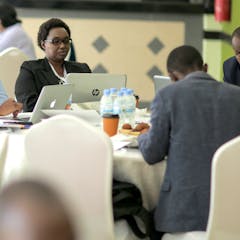
Articles on Journals
Displaying 1 - 20 of 43 articles

Science rankings rely on papers in academic journals. Broadening the view to include many more open-access journals will upend the usual order – thanks to China’s vast number of publications.

Media companies should set up guidelines for how they are using AI.

With its iconic designs and its showcasing of women writers, the Yellow Book gave its name to the decade.

Peer review is an essential part of academic publishing, but it can be exploitative, opaque and slow. There’s plenty journals, publishers and universities can do to make the system work better.

Peer review of research sounds like it should be a conversation between equals. Instead, it can be patronizing, demanding and simply unkind. A group of journal editors thinks this should change.

Rwandan authors have long been sidelined in debates about Rwanda and other conflict-affected societies.

Three-quarters of the academic journals that folded served the arts, social sciences and humanities. The losses weaken the academic communities and activities that formed around these journals.

Reading a scientific paper isn’t such a daunting task when you break it down into manageable steps.

Dear Diary, keeping a daily journal of these pandemic times can help us process them and follow in some great literary footsteps.

The desire of scholars and universities in Africa to fit into a model imposed from elsewhere may hinder development in Africa.

There has been a rapid redirection of resources towards COVID-19-related research. In the long term, this resource reallocation is likely to result in budget cuts in all research areas.

Scientific results are being rushed out quicker than ever to fight coronavirus. Here’s what you need to know about preprints, peer review and the difference between the two.

Sure, there were no Zoom calls or ventilators. But thanks to a prolific diarist, we can see some striking similarities, from daily death counts to quack remedies.

The proliferation of sub-standard journals may be attributed to the proliferation of universities in Nigeria and this demands urgent attention.

Australia’s top scientist Alan Finkel says too many poor quality research papers are being published in Australia, and the system may inadvertently encourage academics to behave badly.

The UC libraries let their Elsevier journal subscriptions lapse and now the publisher has cut their online access. It’s a painful milestone in the fight UC hopes may transform how journals get paid.

An urgent discussion is needed around the cost of research publications.

If South Africa’s Copyright Amendment Bill is accepted as is, it will be detrimental to academic content production.

Digital publishing hasn’t resulted in the free and open access to information many envisioned. Universities are increasingly fed up with a system they see as charging them for their own scholars’ labor.

Parents have engaged in forms of ‘sharenting’ for generations. The digital age has complicated things, but while critics make some valid points, they’re not seeing the forest for the trees.
